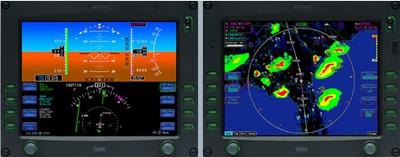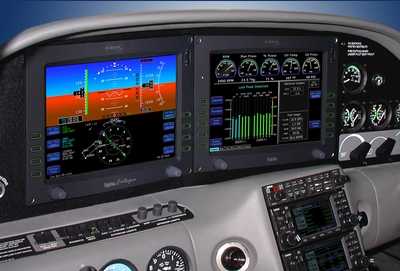Sat, Nov 01, 2003
More than 1,200 people packed Thursday morning's general session
at AOPA Expo to hear several leaders in the avionics industry talk
about the revolution in the cockpit that has occurred over the past
five years.

Mark Sandeen of Avidyne, Gary Kelley of Garmin, and Dan Barks of
Honeywell joined AOPA President Phil Boyer on stage, while
representatives from a number of other companies were also on hand.
Boyer began by pointing out that AOPA is the only aviation
association, GA or otherwise, to have a staff member assigned
full-time to advanced and emerging technologies. Senior Director of
Advanced Technologies Randy Kenagy has been tracking and
shepherding many of the technologies just now becoming available
for as long as the past five to seven years.
All three representatives on stage stressed the safety and
reliability of the new integrated flight decks that have become
available this year. "Total situational awareness is affordable for
everyone," said Avidyne's Sandeen. "The integrated flight decks
help solve situational awareness problems," echoed Garmin's Kelley.
"'What angle is the controller bringing me in on? Is he bringing me
in right over the outer marker?' The new displays help keep the
pilot informed."

During the question-and-answer period, Boyer asked Kelley about
Garmin's acquisition of UPS Aviation Technologies. Kelley assured
Boyer and the audience that Garmin has succeeded by developing new
technologies and driving the price down as low as possible. He said
that buying out one competitor is not going to change that business
model.
One member, noting that he could not use the FAA's Traffic
Information System (TIS) because there was no Mode S datalink
capability in his area, asked if there were any plans to provide
TIS via satellite. Garmin's Kelley responded that he was not aware
of any plans to do so. Kelley said that once ADS-B (automatic
dependent surveillance-broadcast) is widely available, it would be
a better solution. ADS-B-equipped aircraft broadcast a highly
accurate GPS-derived position to other ADS-B-equipped aircraft and
through ground stations to air traffic controllers.
The FAA has been testing ADS-B technology in Alaska's Capstone
project for a number of years. AOPA has been actively and
intimately involved in those tests. FAA Administrator Marion Blakey
acknowledged AOPA's participation during her address at yesterday's
General Session, presenting Boyer with a plaque honoring AOPA for
its role.

"AOPA believes strongly in the value of ADS-B and other cockpit
datalink technologies," said Boyer. "We believe the new
technologies offer such tremendous benefits that pilots will
voluntarily spend money to upgrade. But we will continue to fight
to make sure that the cost of the upgrade does not become the price
of a ticket to use the National Airspace System."
More News
Circle To Runway (Runway Number) Used by ATC to inform the pilot that he/she must circle to land because the runway in use is other than the runway aligned with the instrument appr>[...]
Aero Linx: National Aviation Safety Foundation (NASF) The National Aviation Safety Foundation is a support group whose objective is to enhance aviation safety through educational p>[...]
At Altitude Of About 250-300 Ft Agl, The Airplane Experienced A Total Loss Of Engine Power On November 6, 2024, at 1600 central standard time, a De Havilland DHC-1, N420TD, was inv>[...]
From 2009 (YouTube Edition): Three Hour Flight Was 'Flawless' -- At Least, Until Mother Nature Intervened For anyone who loves the aviation business, this was a VERY good day. Afte>[...]
Also: AMA Names Tyler Dobbs, More Falcon 9 Ops, Firefly Launch Unsuccessful, Autonomous F-16s The Air Force has begun ground testing a future uncrewed jet design in a milestone tow>[...]
 ANN's Daily Aero-Term (05.05.25): Circle To Runway (Runway Number)
ANN's Daily Aero-Term (05.05.25): Circle To Runway (Runway Number) ANN's Daily Aero-Linx (05.05.25)
ANN's Daily Aero-Linx (05.05.25) NTSB Prelim: De Havilland DHC-1
NTSB Prelim: De Havilland DHC-1 Classic Aero-TV: The Boeing Dreamliner -- Historic First Flight Coverage
Classic Aero-TV: The Boeing Dreamliner -- Historic First Flight Coverage Airborne-NextGen 05.06.25: AF Uncrewed Fighters, Drones v Planes, Joby Crew Test
Airborne-NextGen 05.06.25: AF Uncrewed Fighters, Drones v Planes, Joby Crew Test





